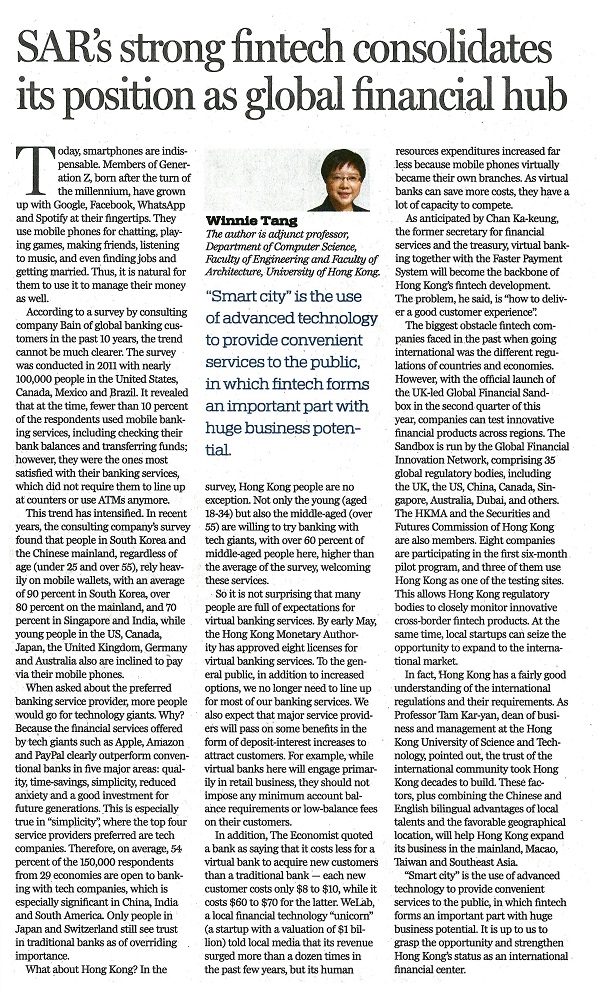網上版請按此

SAR's strong fintech consolidates its position as global financial hub
"Smart city" is the use of advanced technology to provide convenient services to the public, in which fintech forms an important part with huge business potential
Today, smartphones are indispensable. Members of Generation Z, born after the turn of the millennium, have grown up with Google, Facebook, WhatsApp and Spotify at their fingertips. They use mobile phones for chatting, playing games, making friends, listening to music, and even finding jobs and getting married. Thus, it is natural for them to use it to manage their money as well.
According to a survey by consulting company Bain of global banking customers in the past 10 years, the trend cannot be much clearer. The survey was conducted in 2011 with nearly 100,000 people in the United States, Canada, Mexico and Brazil. It revealed that at the time, fewer than 10 percent of the respondents used mobile banking services, including checking their bank balances and transferring funds; however, they were the ones most satisfied with their banking services, which did not require them to line up at counters or use ATMs anymore.
This trend has intensified. In recent years, the consulting company's survey found that people in South Korea and the Chinese mainland, regardless of age (under 25 and over 55), rely heavily on mobile wallets, with an average of 90 percent in South Korea, over 80 percent on the mainland, and 70 percent in Singapore and India, while young people in the US, Canada, Japan, the United Kingdom, Germany and Australia also are inclined to pay via their mobile phones.
When asked about the preferred banking service provider, more people would go for technology giants. Why? Because the financial services offered by tech giants such as Apple, Amazon and PayPal clearly outperform conventional banks in five major areas: quality, time-savings, simplicity, reduced anxiety and a good investment for future generations. This is especially true in "simplicity", where the top four service providers preferred are tech companies. Therefore, on average, 54 percent of the 150,000 respondents from 29 economies are open to banking with tech companies, which is especially significant in China, India and South America. Only people in Japan and Switzerland still see trust in traditional banks as of overriding importance.
What about Hong Kong? In the survey, Hong Kong people are no exception. Not only the young (aged 18-34) but also the middle-aged (over 55) are willing to try banking with tech giants, with over 60 percent of middle-aged people here, higher than the average of the survey, welcoming these services.
So it is not surprising that many people are full of expectations for virtual banking services. By early May, the Hong Kong Monetary Authority has approved eight licenses for virtual banking services. To the general public, in addition to increased options, we no longer need to line up for most of our banking services. We also expect that major service providers will pass on some benefits in the form of deposit-interest increases to attract customers. For example, while virtual banks here will engage primarily in retail business, they should not impose any minimum account balance requirements or low-balance fees on their customers.
In addition, The Economist quoted a bank as saying that it costs less for a virtual bank to acquire new customers than a traditional bank — each new customer costs only US$8 to US$10, while it costs US$60 to US$70 for the latter. WeLab, a local financial technology "unicorn" (a startup with a valuation of US$1 billion) told local media that its revenue surged more than a dozen times in the past few years, but its human resources expenditures increased far less because mobile phones virtually became their own branches. As virtual banks can save more costs, they have a lot of capacity to compete.
As anticipated by Chan Ka-keung, the former secretary for financial services and the treasury, virtual banking together with the Faster Payment System will become the backbone of Hong Kong's fintech development. The problem, he said, is "how to deliver a good customer experience".
The biggest obstacle fintech companies faced in the past when going international was the different regulations of countries and economies. However, with the official launch of the UK-led Global Financial Sandbox in the second quarter of this year, companies can test innovative financial products across regions. The Sandbox is run by the Global Financial Innovation Network, comprising 35 global regulatory bodies, including the UK, the US, China, Canada, Singapore, Australia, Dubai, and others. The HKMA and the Securities and Futures Commission of Hong Kong are also members. Eight companies are participating in the first six-month pilot program, and three of them use Hong Kong as one of the testing sites. This allows Hong Kong regulatory bodies to closely monitor innovative cross-border fintech products. At the same time, local startups can seize the opportunity to expand to the international market.
In fact, Hong Kong has a fairly good understanding of the international regulations and their requirements. As Professor Tam Kar-yan, dean of business and management at the Hong Kong University of Science and Technology, pointed out, the trust of the international community took Hong Kong decades to build. These factors, plus combining the Chinese and English bilingual advantages of local talents and the favorable geographical location, will help Hong Kong expand its business in the mainland, Macao, Taiwan and Southeast Asia.
"Smart city" is the use of advanced technology to provide convenient services to the public, in which fintech forms an important part with huge business potential. It is up to us to grasp the opportunity and strengthen Hong Kong's status as an international financial center.
Dr. Winnie Tang
Adjunct Professor, Department of Computer Science, Faculty of Engineering and Faculty of Architecture, The University of Hong Kong